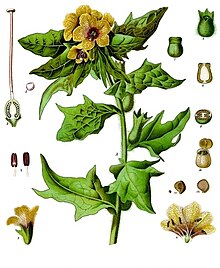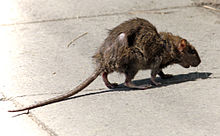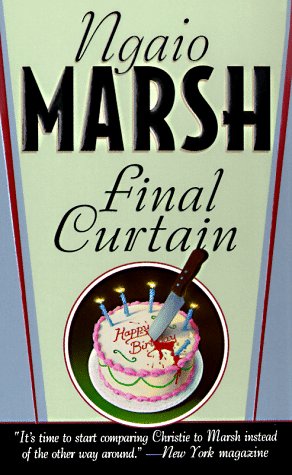Henbane (Hyoscyamus niger) doesn't sound terribly dangerous, does it it? It might be something that would irritate a chicken, but nothing too scary.
But the truth is it's a deadly
poisonous plant in the nightshade family (solanaceae.) Smelling it can
cause dizziness—and eating it can result in delirium, coma, respiratory
paralysis, and death.
Unfortunately others have made the mistake of thinking
henbane is harmless, too. In 2008, the British celebrity chef Antony
Worrall Thompson recommended henbane as a "tasty addition to salads"
in the UK's Healthy and Organic Living magazine.
The magazine sent subscribers an urgent message telling them that eating henbane is a really bad idea. Nobody died as a result that they know of, but it was a scary moment for all concerned.
Henbane, Hens, and other Farm Animals
But it turns out henbane has nothing to do with poultry. The
word first appeared in England in 13th century and probably has Germanic roots. The prefix "hen"
probably meant "death." The word may have been a corruption of a
Dutch word "henneblomen" meaning "death flowers."
The Greek name Hyoscyamus means "pig beans" from húos, "pig" and kúamos, "bean." This may have been because hogs enjoy eating henbane seedpods. One of the many weird
things about henbane is that it is not toxic to pigs, but it will kill most other
livestock as well as birds, fish, and people.
Some say henbane was the "hebenon" of Shakespeare—the potion poured into the ear of Hamlet's father to kill him while he slept.
Some say henbane was the "hebenon" of Shakespeare—the potion poured into the ear of Hamlet's father to kill him while he slept.
Medicinal and Ritual uses of Henbane
Henbane has a long and rich history in folklore because of its painkilling and hallucinogenic properties. Along with mandrake, deadly
nightshade, and Datura it was used for millennia as an anesthetic in
traditional medicine in Europe and Asia.
It also played a part in rituals because of its hallucinogenic
properties. The oracle of Apollo in ancient Greece took henbane and Pliny
the Elder talked of henbane being "of the nature of wine" in
achieving a buzz.
It was also used in Germany until the 16th century to give
some of their beers a more than usual kick.
The Anglo-Saxons thought henbane was especially useful for
treating toothache. This was because the seedpods of henbane are shaped like a
jawbone.
 |
| Anglo-Saxons thought henbane good for toothache |
This is an example of "sympathetic magic," which can still get confused with sound medical research today.
This is the way the sugar industry did such a great job of convincing us all
that
eating fat would make us fat.
eating fat would make us fat.
Henbane was considered something of a cure-all in the middle Ages.
Besides its use as a pain killer, it was said to be good for asthma,
cough, nervous diseases, and upset stomach.
Today it can still be obtained by prescription in some
places. It's used in massage oils, and a bandage containing a small dose of
henbane oil, put behind the ear, is supposed to cure sea-sickness. I think I'd
rather take my chances with Dramamine.
Did Dr. Crippen Murder His Wife with Henbane?
In 1910 London, Dr. Hawley Harvey Crippen was executed for
murdering his wife with henbane—then carving up her body, burying it under his house and attempting to run off to Canada with his lover Ethel Le Neve. The two were apprehended just as they were embarking on their ship by a new-fangled wireless communication device invented by one Mr. Marconi.
The case was the super-trial of the era. The mild-mannered homeopathic doctor insisted that his wife Cora, a flirtatious music hall performer with the stage name Belle Elmore, had run off with another man and that the body under the Crippen house was not hers.
But the fact he possessed henbane seemed enough to convict him. Many thought he was innocent, and had been tried and convicted in the press.
Recently, forensic scientists have examined the evidence anew, because it seemed so odd to them that a poisoner would dismember a body. The point of poisoning is generally to make death appear an accident.
It turns out they were right about Dr. Crippin's innocence. Not only was the body found under the house not poisoned with henbane—it wasn't even a woman.
Dr. Crippin's descendants have petitioned the British government to pardon the doctor and clear his name.
 |
| Dr, Hawley Harvey Crippen |
The case was the super-trial of the era. The mild-mannered homeopathic doctor insisted that his wife Cora, a flirtatious music hall performer with the stage name Belle Elmore, had run off with another man and that the body under the Crippen house was not hers.
But the fact he possessed henbane seemed enough to convict him. Many thought he was innocent, and had been tried and convicted in the press.
Recently, forensic scientists have examined the evidence anew, because it seemed so odd to them that a poisoner would dismember a body. The point of poisoning is generally to make death appear an accident.
It turns out they were right about Dr. Crippin's innocence. Not only was the body found under the house not poisoned with henbane—it wasn't even a woman.
Dr. Crippin's descendants have petitioned the British government to pardon the doctor and clear his name.
Endangered Species
If you're writing a contemporary mystery your villain would have trouble getting hold of henbane. It's not something you can go out and pick in the wild. Although it once grew all over Europe and Asia, henbane is
now an endangered species. But you can see it in the famous poison garden at Alnwick in the UK.
What about you, readers? Have you run into any stories about henbane? Have any good ones to share? Do you have any opinions on Dr. Crippin's guilt or innocence?
What about you, readers? Have you run into any stories about henbane? Have any good ones to share? Do you have any opinions on Dr. Crippin's guilt or innocence?
THE GATSBY GAME
on sale for 99c at Amazon
"In The Gatsby Game, Anne R. Allen blends a perfect combination of witty, sharp narration, a plot that won't let the reader go, and nuanced characters that evoke our caring. A genre novel that artfully transcends its genre.”- Catherine Ryan Hyde, NYT and Amazon #1 best-selling author
THE GATSBY GAME (Romantic Comedy-Mystery) When Fitzgerald-quoting con man Alistair Milborne is found dead a movie star’s motel room—igniting a world-wide scandal—the small-town police can’t decide if it’s an accident, suicide, or foul play.
As evidence of murder emerges, Nicky Conway, the smart-mouth nanny, becomes the prime suspect. She’s the only one who knows what happened. But she also knows nobody will ever believe her. The story is based on the real mystery surrounding the death of David Whiting, actress Sarah Miles’ business manager, during the filming of the 1973 Burt Reynolds movie The Man Who Loved Cat Dancing.
As evidence of murder emerges, Nicky Conway, the smart-mouth nanny, becomes the prime suspect. She’s the only one who knows what happened. But she also knows nobody will ever believe her. The story is based on the real mystery surrounding the death of David Whiting, actress Sarah Miles’ business manager, during the filming of the 1973 Burt Reynolds movie The Man Who Loved Cat Dancing.
The Gatsby Game is available in ebook at all the Amazons, and also at the regular price at Barnes and Noble for NOOK. It's available at Scribd.
And available in paper on Amazon, and Barnes and Noble
Here's a list of all the posts in the poison series










